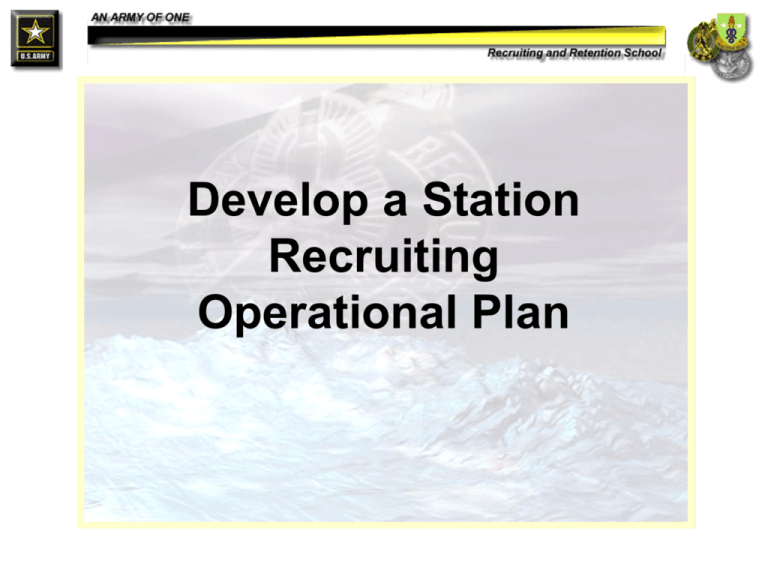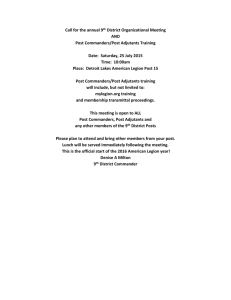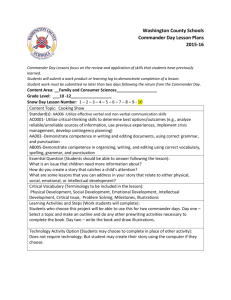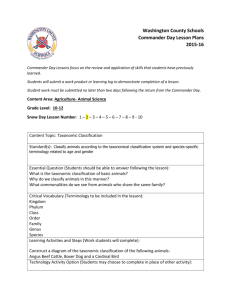Develop a Station Recruiting Operational Plan Action
advertisement

Develop a Station Recruiting Operational Plan Action Develop a Station Operational Plan Conditions Upon receipt of assigned mission, Company ROP, and access to: a. USAREC Manuel 3-0 b. USAREC Manuel 3-02 c. Situational Awareness Board/Binder d. Planning Tool e. School Data f. School Recruiting Plan g. MAP h. USAREC Intranet i. UR 601-95 j. FM 22-100 k. Market Share Data l. OPORDS/FRAGO m. UR 601-107 n. G2/ToS/ LZ reports Standard Develop a Station Recruiting Operational plan that considered the Company external directives and all elements of the ROSs, which identified decisive, shaping, and sustaining operations, while continually adapting to the contemporary operating environment, resulting in increased probability of market domination and mission accomplishment. Visualize • Upon receipt of the mission, station commanders conduct a market analysis. • The results of the analysis help station commanders visualize their station's recruiting operation plan (ROP). Visualize • The plan serves as a guideline and is continually fine tuned during execution. • Station commanders consider their recruiter's plan, The ROS, command guidance and MAP data to develop the stations ROP. Visualize • To properly visualize achievement of the mission, station commanders should clearly understand their market and resources. Visualize • What is the mission? What is the market's propensity? What shaping and sustaining operations should be employed or are scheduled to achieve the mission? • Station Commanders draw on the principles of recruiting, the elements of recruiting power and their own experience to visualize the operation and shape its outcome. Visualize • The RS commander’s vision should identify necessary tasks, who is to do them, and when, where, and why they’re done. • Expected results are not guesses, they are determined by analyzing the recruiter’s historical telephone prospecting performance. DESCRIBE • Station commanders must describe recruiting operations to subordinates. • Station commanders must understand how the accomplishments of individual recruiters will impact the station’s mission. • Mission success occurs through a combination of decisive, shaping, and sustaining operations. DESCRIBE • The station commander’s description and expectations should be clear, and concise. • The station team must conduct all individual operations with the commander's described vision in mind. • Coordinated team activities will contribute to the station's mission success. DIRECT • Station commanders direct recruiting operations by using the recruiting operating system (ROS). • The ROS is composed of seven operational elements • The seven elements of the ROS can be used separately or in combination, depending on the market situation. INTELLIGENCE • The intelligence system (G-2) collects, analyzes, and disseminates data to assist with IPM down to station level. • Station commanders use intelligence to direct recruiting efforts and develop ROP objectives. INTELLIGENCE • IPM includes defining and describing the local recruiting environment, evaluating the market and synchronizing assets to target high payoff zones and events. PROSPECTING (Maneuver) • The Station Commander must employ prospecting as a tactic to locate, identify, and contact potential Future Soldiers. • There are four prospecting techniques: P1 (telephone prospecting), P2 (referral prospecting), P3 (face-to-face prospecting), and P4 (Internet prospecting). PROSPECTING (Maneuver) • The nonlinear use of all prospecting techniques accomplishes simultaneous market penetration. • Prospecting is usually a decisive operation the Commander must take care to employ all assets and resources judiciously. PROCESSING • Station Commanders manage the processing cycle, recruiters should continually reinforce to their applicant’s expectations to prepare them for enlistment. FSTP • Station Commanders supervise the transformation of civilians to future Soldiers through mentorship and training. • The Station Commander must ensure that the recruiters are trained and able to coach mentor and motivate Future Soldiers. TRAINING • Continually evaluate their recruiter’s performance of critical task and I.D training needs. • Soldiers assigned as detailed recruiters will continue to attend primary MOS specific training such as ANCOC and BNCOC. RSS • Recruiter integration and departure procedures. • Administrative functions by the staff to support Soldier well being. • Market intelligence and mission analysis. • Operations, waiver processing. Logistics. advertising and public affairs. C4 • Computers, cell phones, faxes, and emails. has enabled commanders to spend less time in their station and more time with recruiters in their market. • Continually evaluate how C4 can improve communication and command and control. Tracking in the Planner Utilize planners to monitor performance and manage the elements of the ROS. • Conduct informal AAR’s throughout the day asking pointed questions that align the intent with the subordinates activity. • Track results by: − focusing on three to five task that compliment your objectives − allowing the AAR process to guide your daily/weekly schedule − and other necessary task • Check On Learning • Why should the Station Commander Manage the ROS? • How does the Station Commander direct Recruiting Operations? • Mission success occurs through what three operations? • Why must the Station Commander describe his Recruiting Operational Plan to Subordinates? Check On Learning • What primary tool is used by the Station Commander to articulate the ROP? • Name and describe each element of the ROS? • How does the Station Commander analyze each element of the ROS? • How does the ROS the AAR process and the ROP relate? Summary • The Station Commander will receive external directives from the Company Command Group. • The Station Commander must analyze each element of the ROS by conducting a SWOT. • The Station Commander will consolidate their efforts by outlining their short, mid and long term objectives. Summary • The objectives will be placed on the Situational Awareness Board (SAB). • The SAB and the SAB binder is the station commanders primary tool for obtaining the objectives outlined in their ROP. Summary • Station Commanders should use planners to monitor performance and manage the elements of the ROS. • The Station Commander must be able to visualize and describe their ROP and direct their subordinates. Summary • Visualize • Describe • Direct • ROS management • AAR process • Tracking in the planner Questions?




